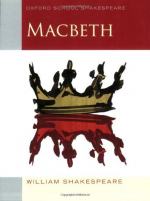|
This section contains 7,301 words (approx. 25 pages at 300 words per page) |

|
SOURCE: Ure, Peter. “Macbeth.” In Elizabethan and Jacobean Drama: Critical Essays by Peter Ure, edited by J. C. Maxwell, pp. 44-62. Liverpool: Liverpool University Press, 1974.
In the following essay, Ure follows the development of Macbeth's character throughout the play, suggesting that he is a tragic and sympathetic, rather than evil, figure.
Who then shall blame His pester'd senses to recoil and start, When all that is within him does condemn Itself, for being there?
Macbeth, v.ii.22-25
In the three previous tragedies the protagonists are faced with situations which are not, essentially, their own creation. Hamlet and Othello both seem to themselves to have dread commands imposed upon them, the one to avenge his murdered father, the other to punish his faithless wife; even Lear, although his conduct provides a kind of excuse, is placed at the mercy and ordering of others. All of them have to...
|
This section contains 7,301 words (approx. 25 pages at 300 words per page) |

|


